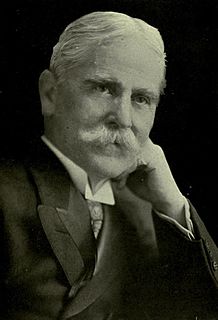A Quote by John Milton
So may'st thou live, till like ripe fruit thou drop Into thy mother's lap.
Related Quotes
Alas! fond child, How are thy thoughts beguil'd To hope for honey from a nest of wasps? Thou may'st as well Go seek for ease in hell, Or sprightly nectar from the mouths of asps. The world's a hive, From whence thou canst derive No good, but what thy soul's vexation brings: But case thou meet Some petty-petty sweet, Each drop is guarded with a thousand stings.
A God must have a God for company.
And lo! thou hast the Son-God to thy friend.
Thou honour'st his obedience, he thy law.
Into thy secret life-will he doth see;
Thou fold'st him round in live love perfectly-
One two, without beginning, without end;
In love, life, strength, and truth, perfect without a flaw.
If thou desire to see thy child virtuous, let him not see his father's vices: thou canst not rebuke that in them, that they behold practised in thee; till reason be ripe, examples direct more than precepts: such as thy behaviour is before thy children's faces, such commonly is theirs behind their parents' backs.
What thou lovest well remains, the rest is dross What thou lov'st well shall not be reft from thee What thou lov'st well is thy true heritage Whose world, or mine or theirs or is it of none? First came the seen, then thus the palpable Elysium, though it were in the halls of hell. What thou lovest well is thy true heritage.
Look what thy soul holds dear, imagine it
To lie that way thou goest, not whence thou com'st.
Suppose the singing birds musicians,
The grass whereon thou tread'st the presence strewed,
The flowers fair ladies, and thy steps no more
Than a delight measure or a dance;
For gnarling sorrow hath less power to bite
The man that mocks at it and sets it light.
Oh, thou did'st then ne'er love so heartily. If thou rememb'rest not the slightest folly That ever love did make thee run inot, Thou has not loved. Of if thou has't not sat as I do now, Wearying they hearer in thy mistress's praise, Thou has not loved. Of if thou hast not broke from company Abruptly, as my passion now makes me, Thou has not loved. (Silvius)
Ere thou sleepest, gently lay Every troubled thought away; Put off worry and distress As thou puttest off thy dress; Drop thy burden and thy care In the quiet arms of prayer. Lord thou knowest how I live, All I'VE DONE AMISS FORGIVE; ALL OF GOOD I'VE TRIED TO DO STRENGTHEN, bless and carry through; All I love in safety keep While in Thee I fall asleep.
If thy desire to raise thy fortunes encourage thy delights to the casts of fortune, be wise betimes, lest thou repent too late; what thou gettest, thou gainest by abused providence; what thou losest, thou losest by abused patience; what thou winnest is prodigally spent; what thou losest is prodigally lost; it is an evil trade that prodigally drives; and a bad voyage where the pilot is blind.
Why dost thou heap up wealth, which thou must quit,
Or what is worse, be left by it?
Why dost thou load thyself when thou 'rt to fly,
Oh, man! ordain'd to die?
Why dost thou build up stately rooms on high,
Thou who art under ground to lie?
Thou sow'st and plantest, but no fruit must see,
For death, alas! is reaping thee.































